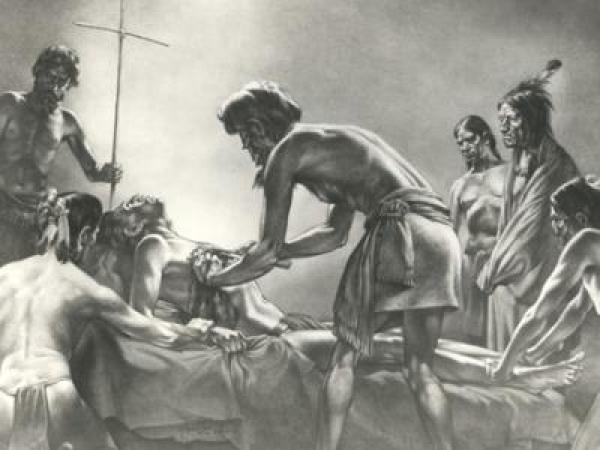GOLD, GLORY OR GOD?
Columbus conquered, Pizarro plundered, and Magellan lost his life battling a Filipino ruler he tried to convert. Was it fame and fortune they were after, or simply the keys to the Kingdom of Heaven?
There is no dispute these early explorers were brave, adventurous and endured hardships that most of us could not. They were living proof of Darwin’s theory that only the strongest and the fittest will survive, and we owe them a debt of gratitude for all their geographic and scientific discoveries. But while they opened the passages and brought nations and cultures together, I can’t help think they also tore some of us apart at the same time. The stories they came back with, whether true or exaggerated, were the first seeds planted in our minds. It was these first impressions and their descriptions of the natives they met that I believe impacted how the rest of Europe saw them then (and how some still see them today).
Many of these New World natives, because of their strange customs and traditions, were depicted as dirty, naked “savages” who practiced voodoo or cannibalism. They were thought of as backward or sub-human because they were not educated, lived off the land, dressed in animal skins and worshipped pagan gods. Simply put, they were thought of as animals, not men.
Anyone who has traveled has probably been guilty of “comparing” one culture to another, me included. I believe it is also normal or typical to be uncomfortable with certain foreign customs and to see them as strange or odd. Also, the inability to communicate compounds the frustration and lack of understanding between the two groups. This I understand, and this I can relate to.
But what I can’t understand (or condone) is the arrogant superiority and lack of respect some of these explorers showed when they first arrived in the Americas. Some brought trinkets to share and some had translators, but the vast majority just hit the ground like conquerors with no concern or regard for the locals and the havoc they were causing. Countless passages have been written of how frightening it was for the natives to see the vast size of the ships that were arriving and to hear gunfire for the first time. Were these new gods to honor or the devil itself?
There was one New World explorer that treated the natives differently, however, but little is known of his experience. His name was Alvar Nunez Cabeza de Vaca, and although he may have arrived like the rest of them with a profit driven mentality, he left as an advocate and supporter of Native American rights and wrote several books on the subject. Like Christopher Columbus and Francisco Pizarro, Cabeza de Vaca was a Catholic sponsored by the same Spanish monarchy during the same general time period, departing Spain in the early months of 1527. But unlike the other two explorers, his royal expedition consisted of a crew of over 600 men, a number that was unheard of at the time. But by the following year, a series of weather related disasters, shortages of food and geographical miscalculations reduced the crew to only Cabeza de Vaca and three others.
Shipwrecked near Galveston Island (aka the Island of Doom) on the Gulf Coast of Texas, the survivors were initially taken prisoner by some local Indians and held captive until they were able to escape two years later. It was the following eight years, however, that really changed how these men viewed the Indians. Traveling by foot across the southwest and down into Mexico, they met tribe after tribe of natives who they traded with and grew to care about and respect. What began as a mutually beneficial but independent co-existence soon developed into a more spiritual and harmonious one after Cabeza de Vaca successfully removed an arrowhead that had struck an Indian above his heart. From that moment on, he and his companions were viewed as “Children of the Sun” and word spread quickly to the other tribes. Soon they had quite a following that walked along with them. In exchange for food, skins and basic survival techniques, the four explorers reciprocated by treating the sick and injured Indians.
While many other explorers were feared or viewed as only plunderers or Christian proselytizers, Cabeza de Vaca’s group was thought of as Gods. Living as the locals did and learning their culture and customs, they saw the southwest Indians as kind, compassionate, generous and hospitable. In a journal entry written by Cabeza de Vaca in 1528, he described the natives as resilient, versatile, useful and flexible. He then added that they were “merry people” who danced and celebrated even through hardship.
Over time, these explorers developed sympathy for the indigenous population and the poor treatment they received by some of the Spanish conquistadors. After they returned to Europe in 1537, Cabeza de Vaca wrote the first European book devoted entirely to North America, a detailed account of the many Indians he met during his journey. Not only was his book an anthropological account of the lives of the natives, it also described the flora, fauna and landscape of the area, including the first sighting of an American buffalo. In Texas, he is viewed as the first explorer of the region and their first historian. But sadly, in later years, he was arrested for his unpopular views and lived a modest life after that with little recognition for the work he had achieved.
Copyright © 2014 (Michelle Parsons, Getting Back on Your Path). All Rights Reserved.

